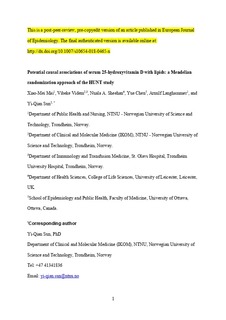Potential causal associations of serum 25-hydroxyvitamin D with lipids: a Mendelian randomization approach of the HUNT study
Journal article, Peer reviewed
Accepted version

Åpne
Permanent lenke
http://hdl.handle.net/11250/2629228Utgivelsesdato
2018Metadata
Vis full innførselSamlinger
Originalversjon
European Journal of Epidemiology (EJE). 2018, 34 (1), 57-66. 10.1007/s10654-018-0465-xSammendrag
Background: Observational studies have shown consistent associations between higher circulating 25-hydroxyvitamin D [25(OH)D] levels and favorable serum lipids. We sought to investigate if such associations were causal. Methods: A Mendelian randomization (MR) study was conducted on a population-based cohort comprising 56435 adults in Norway. A weighted 25(OH)D allele score was generated based on vitamin D-increasing alleles of rs2282679, rs12785878 and rs10741657. Linear regression analyses of serum lipid levels on the allele score were performed to assess the presence of causal associations of serum 25(OH)D with the lipids. To quantify the causal effects, the inverse-variance weighted method was used for calculating MR estimates based on summarized data of individual single-nucleotide polymorphisms. The MR estimate with 95% confidence interval (CI) represents percentage difference in the lipid level per genetically determined 25 nmol/L increase in 25(OH)D. Results: The 25(OH)D allele score demonstrated a clear association with high-density lipoprotein (HDL) cholesterol (p=0.007) but no association with total or non-HDL cholesterol or triglycerides (p ≥0.27). The MR estimate showed 2.52% (95% CI 0.79 to 4.25%) increase in HDL cholesterol per genetically determined 25 nmol/L increase in 25(OH)D, which was stronger than the corresponding estimate of 1.83% (95% CI 0.85 to 2.81%) from the observational analysis. The MR estimates for total cholesterol (0.60%, 95% CI -0.73 to 1.94%), non-HDL cholesterol (0.04%, 95% CI -1.79 to 1.88%) and triglycerides (-2.74%, 95% CI -6.16 to 0.67%) showed no associations. Conclusions: MR analysis of data from a population-based cohort suggested a causal and positive association between serum 25(OH)D and HDL cholesterol. Potential causal associations of serum 25-hydroxyvitamin D with lipids: a Mendelian randomization approach of the HUNT study